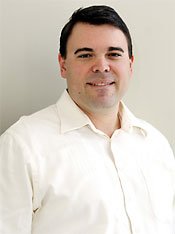Nov 19 2009
New nanoscale materials and devices are required to replace the silicon transistor that's at the heart of today's semiconductors, but to build these new devices, researchers will have to be able to measure the thickness - if that's the right word - of layers consisting of only a few atoms, according to a UT Dallas researcher.
 Dr. Eric Vogel's review of semiconductor technology’s current state of affairs appears in the new "Nanoscience and Technology: A Collection of Reviews from Nature Journals." He is an associate professor of materials science and engineering.
Dr. Eric Vogel's review of semiconductor technology’s current state of affairs appears in the new "Nanoscience and Technology: A Collection of Reviews from Nature Journals." He is an associate professor of materials science and engineering.
“The silicon transistor has enabled the integrated circuit technology revolution for over 30 years, but it is reaching practical and fundamental limits due to its extremely small size, now approaching 10 nanometers,” said Dr. Eric Vogel, an associate professor of materials science and engineering as well as electrical engineering in the Erik Jonsson School of Engineering and Computer Science at UT Dallas. “The ability to measure the physical, chemical and electronic properties of new materials and devices will be crucial to the research and development of future electronic devices.”
Vogel's review of semiconductor technology's current state of affairs appears in the new Nanoscience and Technology: A Collection of Reviews from Nature Journals.”
Although all of the Nature journals (such as Nature, Nature Nanotechnology, Nature Physics and Nature Materials) publish review articles every month, and many of those are related to nanotechnology, only a select few have been chosen for this compilation, which one reviewer called “some of the latest and most advanced reports in the field of nanoscience and nanotechnology.”
Titled “Technology and Metrology of New Electronic Materials and Devices,” Vogel's article describes the technology and measurement challenges of new nanoscale devices and materials being considered for future electronics.
Among the most promising devices and materials being investigated to replace silicon are other semiconductors such as indium, gallium, arsenide and graphene, which consists of a single atomic layer of carbon.
Vogel himself has a wide range of research programs related to future nanoelectronic materials and devices. He leads the University's portion of the Southwest Academy for Nanoelectronics (SWAN), funded by Semiconductor Research Corp. (SRC) through The University of Texas at Austin, which involves six UT Dallas faculty. The program focuses on the materials science, processes, characterization techniques and associated understanding necessary to implement graphene-based devices.
SWAN also funds two of Vogel's graduate students in the area of nanoscale devices for neuromorphic computing, an area that uses the human brain as a model for future low-power computation.
Vogel is also part of a research program funded by numerous agencies (SRC, SEMATECH, the National Science Foundation and the National Institute of Standards and Technology, or NIST) involving the use of compound semiconductors for future transistors, and he is involved in several programs funded by Texas Instruments, one related to nanoscale silicon for biosensors and another related to metal gate electrodes.
Before joining UT Dallas in 2006, Vogel led the CMOS and Novel Devices Group at NIST and was founding director of the institute's Nanofabrication Facility.